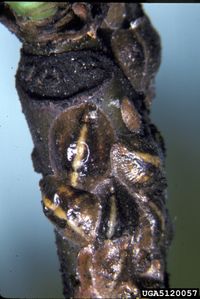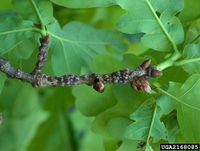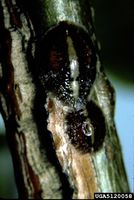Parthenolecanium corni
| Literature database |
|---|
| 46 articles sorted by: |
| • year (recent ones first) |
| • research topics |
| • countries/regions |
| • host plants |
| • list of natural enemies |

Source: United States National Collection of Scale Insects Photographs Archive, USDA Agricultural Research Service - IPM Images
Parthenolecanium corni (Bouché) - (European fruit lecanium)
This soft scale is a widely distributed, serious and polyphagous pest on crops like grapevine, peach, other fruit trees, currant or roses. It infests leaves, twigs and fruits and produces honeydew which promotes the growth of sooty molds. Pruning might increase infestations. The honeydew also attracts ants that protect the scales from natural enemies. It transmits a number of plant viruses like the Grapevine leafroll-associated virus 1.
Mature females mainly reproduce parthenogenetically. There is usually only one generation each year and the 2nd larval stage overwinters on the bark of its host tree. In the spring these move back to twigs and leaves and continue their development. Females can produce several thousand eggs in one year. They lay the eggs inside a brood chamber beneath under the abdomen. After hatching, the crawlers move on the leaves and disperse through the air. The adult females are about 4-6 mm long and reddish brown.
| Vernacular names | |
|---|---|
| • Deutsch: | Gemeine Napfschildlaus |
| • English: | European fruit lecanium brown scale peach scale |
| • Español: | cochinilla de la vid escama café Europea |
| • Français: | lecanium du cornouiller lécanie de la vigne |
Synonyms:
Eulecanium corni
Lecanium corni
For details see the respective page in BugwoodWiki.
- Other images of Parthenolecanium corni (IPM Images - click to enlarge)

